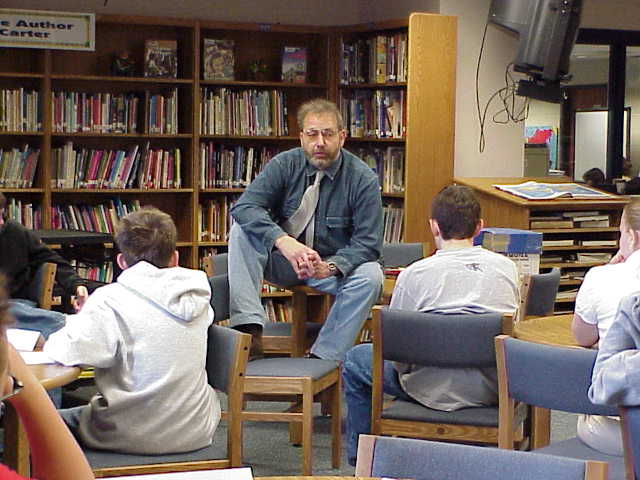Outro: Alden Carter at Altoona Middle School
By: Chris A.

Photo credit: P.Solfest 2002
Aside from Alden Carter's writing duties, he also
does presentations for schools and other
organizations. In May, 2002 he came to see us.
This gave us a
chance to ask him things in person and find out more
about him. We found out the
answers to some of our questions about Crescent Moon
and created our web site to give you the information we found out.
Here are the questions we asked Alden Carter:
1. What inspired you to write Crescent Moon?
My father was born around the time of the setting of the
story, 1912. He knew the history of the Eau Claire area, used to go to
his uncle's cigar store, and used to tell us stories about it. That was
the beginning of Crescent Moon. It was a very exciting time and
also a sad time because they cut all the timber. It was an environmental
disaster.
2. Where did you get the idea for the Indian carving?
In the 1800s, cigar stores used wooden Indians to sell tobacoo
because the settlers first got tobacco from them in trades. To Indians,
tobacco was sacred and used in their rites. Setters didnít look at it that
way. They only saw them as sellers of tobacco, so they used the wooden
figures to sell cigars and other tobacco products. There is a cigar store
wooden Indian in the Chippewa Valley Mueum. It was carved around 1900 and
was in my Great Uncle William Kellyís cigar store in downtown Eau Claire.
It is now on loan to the Chippewa Valley Museum. Great Uncle William sold
tobacco and had soda fountain. When I started writing the book people no
longer looked on tobacco as a good thing. Itís not. So I changed the location
to a sundries store. Rather than carve a cigar store Indian, Uncle Mac
carved an Indian princess to commemorate his people. In the story it also
brought up Two Horseës dislike for how settlers regard tobacco and their
use of the cigar store Indian. So the wooden Indian in the Chippewa Valley
Museum is not "Crescent Moon."
3. Did you get any ideas for the book from
personal experiences?
The characters are made up and the story is made up but they
are true to life and representive of the time. Nothing is ever created
in a vacuumn. I never write about a specific person or an exact incident,
but I take incidents and adapt them.
4. Did you do a lot of research?
Yes, I spent a lot of time at the library, particularly reading
old newspapers. It is important to get the facts right.
5.How long did it take to write Crescent Moon?
It took five to six months for the first draft. Actually,
it was first published as a childrenís picture book. Eventually, I took
it back from the publisher and, at my sisterís suggestion, made it into
a novel. I am a deliberate writer. I work in excess of 40 hours a
week writing. I have 20-25 drafts of a book and, after the editor sees
it, there's another one. I take another one to one and a half months rewriting,
making changes, and then rewriting again before it goes to a copy
editor.
6. Did you know how the story was going to end before
you started?
I usually do know how a story will end. Thatís not how
all authors work. I know the beginning and end. Then, if you put good characters
in conflict, they will move the story along. Characters take over your
book. Usually I write the first draft in the afternoon then I edit it the
next morning. Sometimes I have no idea where that writing came from. Sometimes
the characters are so insistent on getting their story told that they will
make me work 10-14 hours a day. I did some things in Crescent Moon I had
not been able to do before. Each time you write you get better at it.
7.Were there any lessons you were trying to get
across in Crescent Moon?
Iím a story teller first. My interest is in telling the story.
What I will say it that what I believe in more than anything is courage
and decency. I donít believe a whole lot in villains. One of the reasons
I chose to write for young adults is because I believe theyíre courageous.
Maybe readers will see some of that.
Back
to Alden Carter Pg.
(c) P. Solfest 2002
Sources:
Interview May, 2002
www.tznet.com
This web page was last update on 4 / 5 / 02.